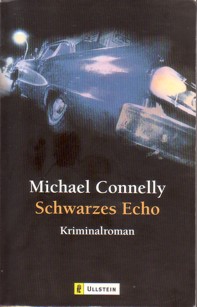Connelly Michael
Schwarzes Echo (The Black Echo)

Endlich ist dem Leseteufel Connellys Debutroman von 1992 in die Finger gekommen, und es ist unglaublich, mit welcher Perfektion der Autor seinen Harry Bosch von Anfang an gestaltet hat. Er gibt ihm schon bei seinem ersten Auftreten hier eine reiche Vorgeschichte, beschreibt zwei seiner Fälle, unter anderem den “Dollmaker”, der in einem späteren Roman die Hauptrolle spielt. Connelly muss als Gerichtsreporter schon lange mit Harry schwanger gegangen sein, ehe er diesen Thriller dann wirklich schrieb.
Bosch liegt, wie wir gewohnt sind, sowohl mit seinen Vorgesetzten von der LAPD, als auch mit dem FBI und der internen Kontrollgruppe IAD im Clinch, legt sich mit allen, die in seinen Weg kommen, an und kämpft sich trotzig und hartnäckig durch bis zum für ihn bitteren Ende. Aber so ist er halt, kein echter Charmebolzen und auch nicht wirklich sympathisch.
Connelly arbeitet dabei auch ein Stück amerikanische Geschichte auf, nämlich die der “tunnel rats” im Vietnamkrieg, zu denen auch Harry gehörte. Als einer seiner damaligen Kumpels in einer Röhre tot aufgefunden wird, glaubt Harry als einziger nicht an Tod durch Überdosis und lässt sich durch niemand von seinen Nachforschungen abhalten, wobei er eigene Alpräume aus dem schmutzigen Krieg aufarbeiten muss. Er kommt schließlich einem raffinierten Bankraub in LA auf die Spur, bei dem die Täter einen Tunnel gegraben hatten. Ein weiterer derartiger Raub wird vorbereitet.
Das FBI nimmt Harry an die Kandare mittels der Agentin Elenor (Harrys späterer Frau), aber er bleibt der einsame Wolf, der - von Beginn an unausweichlich - schließlich in der Tunnelunterwelt von LA der Lösung des sehr vielschichtigen Falles entdeckt.